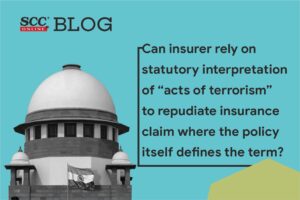Supreme Court: In an insurance repudiation case the Division Bench of Ajay Rastogi and Abhay S. Oka*, JJ., held that where the insurance policy expressly defines a term the insurance company cannot rely on Statutory interpretation of the same to repudiate the insurance claim.
The Court reversed National Consumer Disputes Redressal Commission’s (NCDRC) judgment by which it had held that the insurance company was justified in repudiating the claim.
Factual Backdrop
The appellant had taken Standard Fire and Special Perils Policy from the insurance company in respect of his Engineering Workshop and Plant. The total sum assured was Rs.26,00,00,000 under the policy covering the loss on account of fire, lightning, explosion, riots, strike etc.
As per the claim made by the appellant, after midnight of 22-03-2010, about 5060 antisocial people with arms and ammunition entered the factory premises of the appellant and caused substantial damage to the factory, machinery, and other equipment. The mob demanded money and jobs for local people. The appellant contended that the object of the incident was to terrorise the management of the appellant and workers in the factory by forcing them to pay a ransom to the miscreants.
The appellant lodged a regular claim with the insurance company. The surveyor assessed the loss at Rs.89,43,422 while the appellant claimed that the insurance company was liable to make an interim payment of Rs.1.5 crores. However, the insurance company repudiated the appellant’s claim relying on the Exclusion Clause of the policy regarding loss or damage caused by the acts of terrorism.
Findings of NCDRC
Therefore, the appellant approached NCDRC complaining about deficiency in the service offered by the insurance company. By the impugned judgment and order, the NCDRC held that because of the “Terrorism Damage Exclusion Warranty”; i.e., the Exclusion Clause, the insurance company was justified in repudiating the claim of the appellant. The NCDRC held that the damage caused to the factory and equipment of the appellant was due to an act of terrorism.
Analysis and Findings
The Exclusion Clause of the policy defined the act of terrorism as—“the actions can be termed as acts of terrorism provided the same are committed for political, religious, ideological or similar purposes. The words ‘similar purposes’ will have to be construed ejusdem generis.”
Noticeably, the repudiation of the policy was based on the Preliminary Survey Report, Investigation Report, and the Final Survey Report. However, the Court noted that the Survey Reports could not throw any light on the question whether there was an act of terrorism, the Investigation Report did not conclusively prove that the persons involved in the incident belonged to Maoist or similar groups. Similarly, the FIR and Closure Report did not refer to acts of terrorism as defined under the Exclusion Clause, rather it showed that the police had registered a case against 105 miscreants who could not be traced.
Therefore, the Court held that the insurance company had not discharged the burden of bringing the case within the four corners of the Exclusion Clause.
The insurance company had argued that since the police had invoked Section 17 of the Criminal Law (Amendment) Act, 1908 against the miscreants for unlawful association, the very fact that the provisions of the Amendment Act of 1908 had been applied showed that the loss caused to the appellant was due to a terrorist act. The Court, rejecting the contention of the insurance company held,
“When the policy itself defines the acts of terrorism in the Exclusion Clause, the terms of the policy being a concluded contract will govern the rights and liabilities of the parties. Therefore, the parties cannot rely upon the definitions of ‘terrorism’ in various penal statutes since the Exclusion Clause contains an exhaustive definition of acts of terrorism.”
Conclusion
Thus, the Court concluded that the NCDRC had committed an error by applying the Exclusion Clause. The policy specifically covered the damage caused by riots or violent means. Hence, the Court held that the decision to repudiate the policy could not be sustained.
Resultantly, the impugned order was set aside. However, noting that adjudication would have to be made on the quantum of the amount payable to the appellant after appreciating the evidence on record, including the valuation reports, the Court remanded the matter to the NCDRC for reconsideration. Further, relying on the expected damage estimated by the insurance company’s valuer, the Court directed the insurance company to deposit a sum of Rs.89,00,000 with the NCDRC with liberty to the appellant to make an application for withdrawal.
[Narsingh Ispat Ltd. v. Oriental Insurance Co. Ltd., 2022 SCC OnLine SC 535, decided on 02-05-2022]
*Judgment by: Justice Abhay S. Oka
Appearance by:
For the Appellant: Santosh Kumar, Advocate
For the Insurance company: Santosh Paul, Senior Advocate

